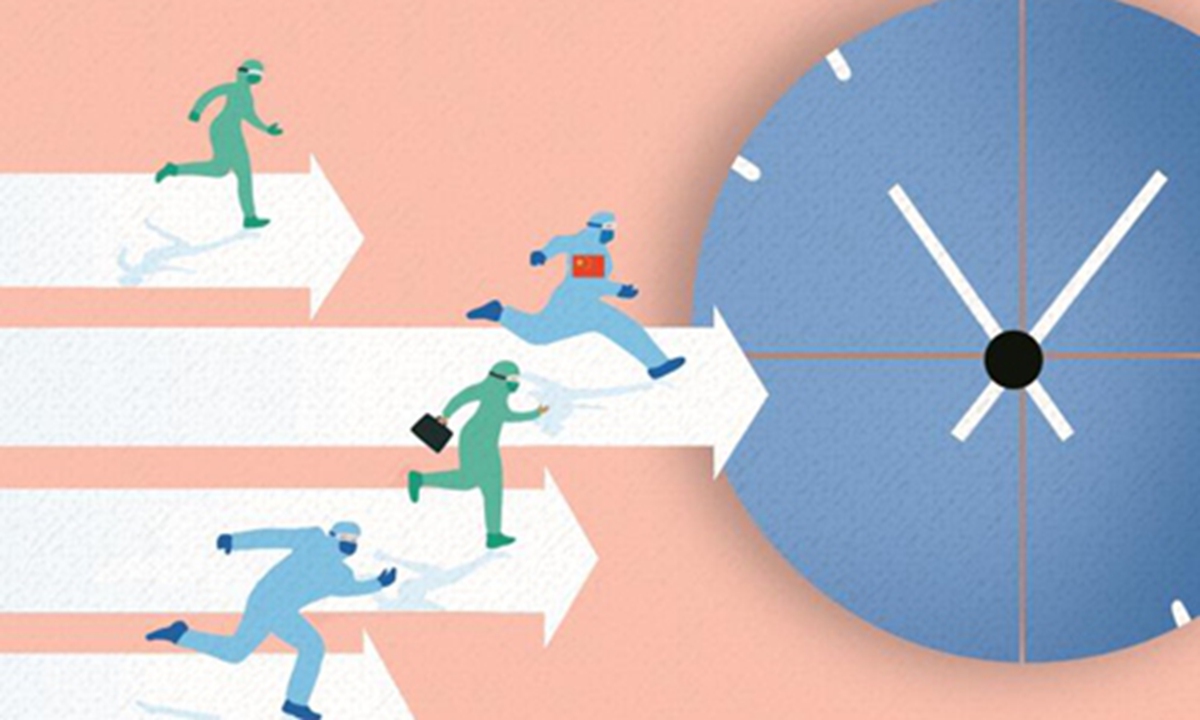China must be tough for next virus fight: Global Times editorial
Source: Global Times Published: 2020/12/25 23:13:39

Illustration: Liu Rui/GT
The most significant global problem this winter is to fight the COVID-19 pandemic. The surging confirmed cases in the US and Europe, the emergence of new variants of coronavirus and sporadic cases in many parts of China in addition to the accelerated use of vaccines are all reminding us of this fact.
There is no doubt that China has now maintained the best overall anti-epidemic situation. China's national prevention and control system has repeatedly proven itself effective. As accurate measures are being taken to prevent imported cases and a domestic rebound, the Chinese people have been protected before mass vaccination. At the same time, China is among the leading countries in terms of vaccine research and development. Several Chinese vaccines are in late-stage trials and will be put into use. The Chinese economy has risen from its lowest ebb and witnessed a stable recovery of growth. While major regions around the world are still facing huge uncertainties, China has performed well on both the anti-epidemic and economic fronts and will maintain such positive momentum.
The advantages of the Chinese system and the country's economic and technological strength have interacted with each other, unleashing tremendous power this year. The bigger the challenge, the stronger and calmer we become.
Of course, the epidemic fight has proven to be an extremely usual protracted war. Some countries that successfully contained the first wave of the epidemic have now fallen into a serious crisis again. They have offered a lesson for us. Since this autumn and winter, the virus found loopholes in different parts of China in different ways, showing that the virus raging outside China could indirectly add pressure to China's domestic epidemic prevention efforts. The coronavirus has displayed its ferocity which may ruin the hard-won situation that a country or region has achieved at any time.
Therefore, China must be strictly on guard and defend itself to the last moment. It cannot relax its efforts due to "anti-virus fatigue." Although effective implementation of the existing prevention and control measures cannot eliminate sporadic cases from occurring, large-scale outbreaks could be practically avoided. After the first wave of the epidemic in China, the scale of local outbreaks is becoming increasingly smaller, and it takes less time to clamp down on them. Such a trend must be maintained.
It's equally important to keep the economic situation turning for the better. This poses higher requirements on targeted anti-epidemic efforts. Once a new case is detected, it should be dealt with quickly without causing overall panic. The local affected areas should maintain the basic order of economic and social life to the greatest extent. This requires both a strong capability to continuously sum up experiences and the spirit of assuming responsibilities.
The epidemic fight is not only about an adherence to existing mature measures, but also a process of improving prevention and control efficiency and constantly making innovations. In the end, it's a battle to bring sporadic cases under firm control, preventing them from spreading further, while at the same time not allow the process to impact the economic and social life. A suitable balance must be explored and pursued. China must create such a miracle in its epidemic fight.
Human beings are adopting vaccines as a tool. The role of a vaccine is like a bomber or tank in battles fought by infantry. Whoever controls the vaccines and how such vaccines will be used will greatly affect the future anti-epidemic pattern and cause some results that cannot be expected today.
The ideal scenario is that vaccines become public goods for humans to fight against the coronavirus no matter who develops them. They will be used as a 100 percent scientifically-based tool, rather than for political leverage.
It's believed this is the desire of all Chinese people. But to promote such a situation, vaccines developed by Chinese companies must be effective and widely applicable. In light of the US' overbearing nature in the past, people have the reason to worry that if the US-developed vaccines dominate the next stage of the pandemic fight, it's impossible for Washington to not politicize the distribution and use of the vaccines.
The incumbent US administration once publicly said it gives Americans "first priority" for US-made COVID-19 vaccines. It's easy to say different US allies will be given different orders. Where will the developing countries be put then? Only when vaccine competition can shake off the order of use established according to US selfishness, can it become a fortress to protect the national interests and security of developing countries.
China needs to speed up its pace of launching the vaccines onto the market. Western public opinion is not positive toward Chinese vaccines. They won't help advertise the advantages of Chinese vaccines in terms of safety, the low price and wide applicability. But if any problem occurs, they will have great interest in making an issue out of it. On one hand, we need to make the merits of Chinese vaccines known to the world, on the other, we must let the world understand and cherish the importance of Chinese vaccines in maintaining equity in the global pandemic fight.
The pandemic fight is moving on. People should overcome the crisis in a more fair way and create a better future together. Each step in the pandemic fight shouldn't worsen the situation that different countries will be treated differently.
Posted in: EDITORIAL